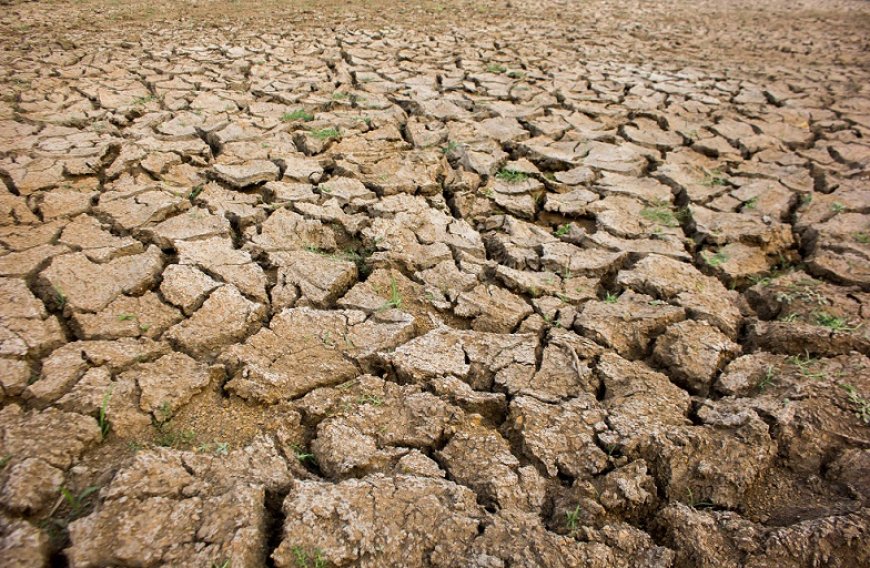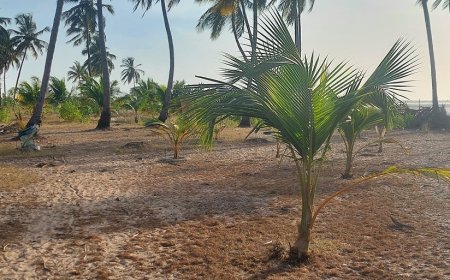Executive Summary
Introduction
The 28th United Nations Climate Change Conference (COP28) convened amidst escalating climate challenges, placing strong focus on climate adaptation and resilience. COP28's recognition of the need for adaptation financing and support acknowledges the imperative to bolster resilience in developing countries, where securing funds for climate action is paramount. The outcomes also underscored the importance of technology transfer, capacity-building initiatives and nature-based solutions.
The emphasis on adaptation and resilience is especially relevant for West African nations. Climate change poses an increasingly urgent challenge for countries such as Ghana, Nigeria and Senegal, impacting critical sectors of their economies and overall well-being. The surge in climate-related disasters, encompassing droughts, floods and coastal erosion, poses a severe threat to development progress. In response, nations in the region are actively implementing climate change adaptation policies aligned with their Nationally Determined Contributions (NDCs). However, two significant concerns arise in the implementation of NDCs.
Firstly, as one of the most climate-vulnerable regions globally, West African countries heavily rely on external financing to fulfill their NDCs. The limited fiscal capacity of governments in the sub-region further complicates the implementation process. Secondly, there is a notable lack of attention and recognition for the contributions of local actors in the design and implementation of climate actions.
Shining a spotlight on local actions demonstrates the crucial role played by communities at the forefront of climate adaptation efforts. Meaningful local engagement not only provides a key avenue for achieving multiple societal goals but also serves as a transformative approach to climate action. Recognizing and valuing the contributions of local actors are essential steps in fostering effective and inclusive climate resilience in West Africa.
Objective of study
APRI - Africa Policy Research Institute – partnered with organizations in Ghana, Nigeria and Senegal, as well a range of nationally-based policy, research and practice stakeholders to launch the ‘Climate adaptation in West Africa: Strategies, practices and initiatives’ project. This project investigated, documented and communicated potential gaps, challenges, opportunities, and entry points for adaptation to inform the country’s NDC implementation. This research project also interrogated the alignment of endogenous adaptation practices with adaptation options of the NDCs and other climate action policies and strategies. It particularly highlighted locally-led adaptation (LLA) strategies, practices and lessons to offer guidance for the implementation of the NDCs and climate actions at the local and national levels.
More specifically, the project sought to understand and document:
- status, needs and priorities for climate actions in Ghana, Nigeria and Senegal;
- adaptation priorities and needs of local communities;
- available policies, strategies, practices and initiatives at national and community levels to address adaptation needs;
- challenges and barriers hindering LLA actions in the three countries;
- potential opportunities and entry points to support and encourage effective and sustained adaptation action for at-risk and vulnerable communities;
- recommendations for advancing local adaptation as a key component of NDCs in the sub-region.
The study employed a methodological approach that encompassed mapping the climate policy landscape, implementation strategies and practices at local and national levels in Ghana, Nigeria, and Senegal. It began with an extensive literature review and analysis of relevant climate change documents to establish existing knowledge and develop a robust understanding of the policy landscape. The policy landscape mapping included three critical tasks: evaluating policy frameworks for climate action, assessing stakeholders' capacity to incorporate local adaptation strategies, and scrutinizing the coherence or inconsistency of local adaptation policies with each country's needs, priorities and international development goals and commitments. This was followed by two stakeholder engagement meetings in each country, convening a diverse group of national, regional and local stakeholders in the climate change field. The aim was to align the research objectives with the context, needs and priorities of policymakers and society in each country. Furthermore, each national team conducted three in-depth case study analyses, concentrating on one of the three priority adaptation sectors outlined in the countries’ NDCs.
Key findings
Africa and its people face an urgent need to adapt to the impacts of climate change, given the continent's vulnerability to its effects. Despite being the least responsible for the historical greenhouse gas (GHG) emissions, Africa bears a disproportionate burden of its impacts. Changing weather patterns, increased frequency of extreme weather events and rising temperatures pose significant challenges to agriculture, water resources and overall ecosystem stability. Communities across Africa, many of whom rely heavily on agriculture for their livelihoods, are particularly susceptible to these changes. Adaptation strategies must be prioritized to enhance resilience, protect communities from climate-related risks and ensure sustainable development.
African countries have been actively working to put in place adaptation plans, as often reflected in their NDCs. Recognizing the urgent need to address climate change impacts, many African nations have outlined comprehensive strategies to enhance the resilience of their most vulnerable communities. These plans often include measures to improve water resource management, promote sustainable agriculture and strengthen early warning systems for extreme weather events. While the specifics vary among countries and local contexts, they share the common goal to build strong institutions and foster partnerships with a view to mobilize finance, access technologies and strengthen their skills base.
Senegal, Ghana and Nigeria are three of the countries that have undertaken significant steps towards meeting the adaptation needs faced by large numbers of highly vulnerable people. These countries have developed and implemented various strategies, often outlined in their NDCs, to enhance resilience and mitigate the impacts of a changing climate. However, despite these commendable efforts, they continue to face substantial challenges, particularly due to the availability of limited financial resources and their weak institutional and human capacities. Additionally, there are concerns about the integration of climate considerations into broader development policies and the gap between the scientific knowledge produced by the research community and the action taken by practitioners on the ground. Insufficient coordination and collaboration among government agencies and local stakeholders hinder the smooth integration of adaptation measures and diminish the effectiveness of policies, ultimately impeding the adoption of sustainable adaptation practices.
Integration of climate considerations in development policies is crucial for building local resilience. Historically, climate change adaptation planning has often operated independently from broader sectoral development policies. This is of particular concern in regard to local adaptation efforts which isolates local economies and livelihoods from the broader development planning processes. It becomes crucial to synchronize national, sub-national and sectoral strategies to guarantee a cohesive and coordinated response to minimize duplicated efforts, fragmented initiatives and inefficient resource utilization.
Experience across Ghana, Nigeria and Senegal demonstrate that communities have been adapting to the impacts of climate change, to varying degrees. However, they lack access to the necessary resources and power for implementation. Despite being well-placed to understand their priorities, local actors often find themselves receiving decisions from distant experts rather than taking leadership roles in climate finance planning. The current climate finance model channels funds through numerous intermediaries for short-term projects; local decision-making in climate interventions is frequently deficient, affecting project effectiveness and sustainability.
Expanding locally-led adaptation (LLA) strategies by communities in Senegal, Nigeria and Ghana can play a major role in addressing the unique challenges posed by climate change on local communities. Such strategies can leverage the invaluable local knowledge, practices and experiences of communities, ensuring that adaptation efforts are contextually relevant and durable. Local communities are often the first to feel the impacts of climate change, and their active involvement in co-designing and implementing adaptation measures is crucial. LLA fosters a sense of ownership and empowerment, enhancing the opportunities for transformative change in the face of environmental changes and associated disruptions. By tapping into indigenous knowledge and incorporating community perspectives, LLA contributes to more effective, inclusive and culturally sensitive adaptation strategies, aligning with the principles of sustainable development. This bottom-up approach recognizes the diversity of challenges across different areas and promotes a collaborative effort to strengthen climate resilience at the grassroots level.
LLA strategies in Senegal, Nigeria and Ghana face a number of stumbling blocks. LLA strategies exhibit distinctive characteristics, including participatory practices, diversified approaches, prioritization of vulnerable community members, and the utilization of local knowledge to enhance resilience. Despite spontaneous adaptation efforts by many segments of society in Ghana, Nigeria and Senegal, planned adaptation processes by key stakeholders often overlook these grassroots initiatives and place insufficient appreciation and emphasis on endogenous knowledge and practices, while failing to integrate them into national and global solutions. The constrained role of women and disadvantaged groups in LLA also pose major shortcomings. Addressing these weaknesses is essential to maximize the potential of LLA in these countries and to ensure comprehensive and locally-tailored climate adaptation practices flourish.
The essential contribution of women to the success and sustainability of climate resilience efforts in locally-led adaptation (LLA) practices is evident in the cases examined from Ghana, Nigeria and Senegal. Despite their crucial roles in managing household resources, agriculture and community welfare, women face constraints in participating in decision-making and holding leadership positions within LLA initiatives. Prevailing gender norms and societal expectations often confine women to traditional roles, limiting their active engagement in shaping and executing adaptive strategies. This restriction extends to LLA, where the distinctive perspectives, knowledge and experiences of women are not fully leveraged.
LLA practices among agricultural and fishing communities in Ghana, Nigeria and Senegal encounter a significant funding gap attributed to inadequate domestic resources and unreliable international climate finance. This impedes the execution of locally-customized solutions, restricting the transformative potential of scaling up LLA efforts. Addressing this funding deficit is vital to empower communities, foster innovation and guarantee the sustainability of adaptive measures. Mobilizing resources across local, national and international domains becomes imperative to unleash the complete potential of LLA and enhance the resilience of communities at the forefront of climate change.
Ensuring the success of LLA practices is contingent upon access to evidence-based knowledge. LLA aims to empower communities to develop context-specific solutions tailored to their distinct vulnerabilities and needs. This necessitates the generation of local data and information to build the knowledge and evidence essential for informing on-the-ground adaptation strategies. The disparity between scientific knowledge and practical implementation frequently results in suboptimal decision-making. Access to evidence-based knowledge stands out as a critical challenge in LLA endeavors across West Africa. To address this, countries must invest in robust climate services, expert training, support for vulnerability assessments and the formulation of adaptation plans for various sectors and territories.
In all three countries, the existing institutional landscape holds untapped potential for fostering resilient communities through LLA practices. Utilizing and strengthening existing institutions can provide a strong foundation for sustainable and impactful adaptation efforts. These existing structures often carry valuable insights into the community's needs, priorities, vulnerabilities and adaptive capacities. Strengthening them entails empowering them with the requisite resources, knowledge and capacities to spearhead climate adaptation initiatives. This support may come in the form of capacity-building programs, financial resources or collaborative partnerships with governmental and non-governmental entities.
Establishing platforms for communities of practice and mutual learning in climate adaptation holds immense potential for collective learning and collaboration. These could serve as incubators that bring together local communities, policymakers, researchers and practitioners to benefit from each other's insights and expertise and build trust and strong relationships. They provide a space for dialogue, where challenges can be openly discussed, and adaptive strategies co-created.
Recommendations
For National Policy Community
- Devolve and develop climate governance and institutions at the local level: Climate governance stakeholders must recognize the importance and added value of locally-led adaptation and encourage the integration of communities' endogenous adaptation practices into the various priority adaptation options of the NDC for greater efficiency, performance, and impact in climate action.
- Devolve and enhance access to climate adaptation financial resources: Government and policymakers must develop mechanisms to improve access to financial resources for local governments and communities, especially for small-scale farmers, women's groups and community-based organizations involved in climate adaptation initiatives at the local level.
- Strengthen capacity-building efforts: The government and policymakers must invest in capacity-building programs to empower local communities with the knowledge, skills and tools needed to design and implement climate adaptation strategies. This includes providing training on climate-smart agriculture, sustainable land management, ecosystem restoration and disaster risk reduction, among other relevant topics.
- Integrate traditional knowledge and practices into climate adaptation strategies. Local communities possess valuable traditional wisdom developed over generations to cope with environmental changes. Incorporating these valuable knowledge and approaches to support policies can enhance the effectiveness and cultural appropriateness of adaptation actions.
- Encourage and support collaborations between research institutions, policymakers, civil society organizations and local communities: This collaboration is critical to ensure that all relevant stakeholders are included in the identification, documentation and communication of relevant local adaptation experiences in order to generate knowledge to inform and support decision-making and implementation processes of the NDCs and other national and local development policies and strategies.
- Facilitate community engagement and participation: Federal and central government policymakers and actors currently exhibit a gap in comprehending the significance of social cohesion, inclusion and civic engagement in fostering trust and equity among community members. Increased effort and resources are required to promote community engagement and participation. This entails actively involving local communities in decision-making processes related to climate adaptation, taking into account their knowledge, needs and perspectives.
- Raise awareness about climate change, its impacts, adaptation measures and associated benefits: The results of this research show that many communities have been engaging in adaptation actions for decades without an in-depth understanding of climate change.
For the International community
- Champion the integration of locally-led adaptation (LLA) action into the implementation of national and global climate goals: Considering the alignment of community adaptation strategies with NDCs and other national policies, the international community, led by the UNFCCC, should promote and incentivize countries and partners to prioritize LLA in financial support and implementation.
- Strengthen capacity-building and knowledge-sharing: Support capacity-building programs and knowledge-sharing platforms that facilitate the exchange of best practices, lessons learned and experiences between local communities, practitioners and policymakers from different countries. This can include funding training programs, workshops and conferences that focus on enhancing the skills and knowledge of local actors in climate adaptation.
- Increase international climate finance for LLA: Enhance funding and allocate financial resources exclusively for the support of locally-driven climate adaptation initiatives. Achieve this by creating dedicated funds, grant programs and financial mechanisms that prioritize and direct resources to local communities and organizations.
- Adapt proactive and innovative ways to finance and ensure access to local level actors: Climate facilities such as the Green Climate Fund (GCF), the Adaptation Fund (AF), the Global Environment Facility (GEF) and bilateral development agencies must set up a common fund exclusively reserved for financing local adaptation initiatives directly led by communities to make endogenous practices more sustainable and increase the efficiency and performance of climate action.
- Allocate resources to support comprehensive climate research and data collection, especially in respect to local and indigenous knowledge, practice and strategies. The international community should seek partnerships with the governments and local institutions to allocate resources needed to support comprehensive climate research and data collection. This information would provide a solid foundation for evidence-based decision-making, risk assessments and adaptation planning.


